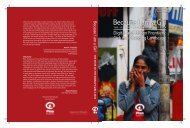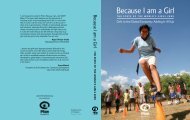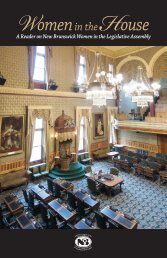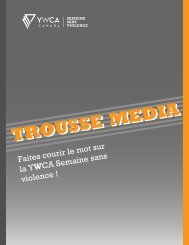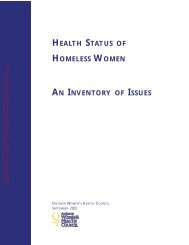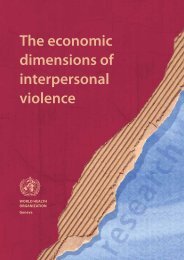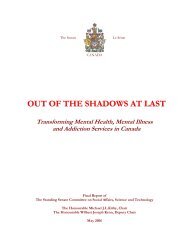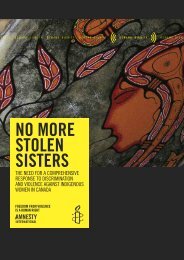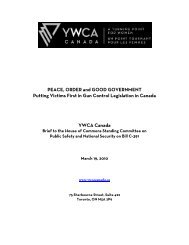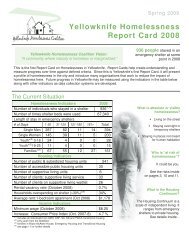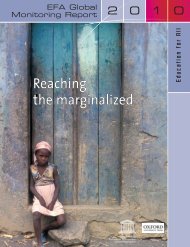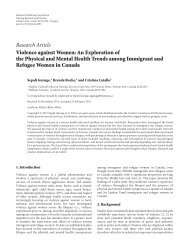Gender Report Card on the International Criminal ... - YWCA Canada
Gender Report Card on the International Criminal ... - YWCA Canada
Gender Report Card on the International Criminal ... - YWCA Canada
Create successful ePaper yourself
Turn your PDF publications into a flip-book with our unique Google optimized e-Paper software.
Judiciary – Key Decisi<strong>on</strong>s Admissibility<br />
encapsulated a high threshold for unwillingness and<br />
inability, Judge Ušacka held that ‘<strong>the</strong> Court should not<br />
circumvent this threshold created by unwillingness or<br />
inability by requiring a State to prove, eg <strong>the</strong> existence<br />
of a full-fledged investigati<strong>on</strong> or prosecuti<strong>on</strong> of a<br />
case in order to establish that <strong>the</strong>re is no situati<strong>on</strong> of<br />
inactivity’. 1660 She stressed that in its determinati<strong>on</strong><br />
of inactivity, <strong>the</strong> Chamber should adhere to <strong>the</strong> spirit<br />
of <strong>the</strong> Statute. With regards to <strong>the</strong> case at hand, Judge<br />
Ušacka held that <strong>the</strong> Pre-Trial Chamber failed to give<br />
sufficient weight to <strong>the</strong> sovereign rights of Kenya. 1661<br />
She found that <strong>the</strong> Pre-Trial Chamber failed to<br />
appreciate that it should have employed its discreti<strong>on</strong><br />
to adapt <strong>the</strong> proceedings to <strong>the</strong> current case and<br />
should have accepted <strong>the</strong> submissi<strong>on</strong> of additi<strong>on</strong>al<br />
informati<strong>on</strong> by Kenya. She held that ‘more importantly,<br />
though, <strong>the</strong> Pre-Trial Chamber did not fully c<strong>on</strong>sider this<br />
matter in light of <strong>the</strong> fact that, within a short period of<br />
time, Kenya would reach <strong>the</strong> level of an investigati<strong>on</strong><br />
that would satisfy <strong>the</strong> standards of <strong>the</strong> Pre-Trial<br />
Chamber’. 1662<br />
Fundamentally, Judge Ušacka held that <strong>the</strong> Pre-<br />
Trial Chamber decisi<strong>on</strong> rejecting <strong>the</strong> admissibility<br />
challenge should be reversed. In her opini<strong>on</strong>, <strong>the</strong> Pre-<br />
Trial Chamber should rec<strong>on</strong>sider <strong>the</strong> admissibility<br />
challenge and <strong>the</strong> matters arising from it after<br />
c<strong>on</strong>ducting <strong>the</strong> proceedings in a way that fully balances<br />
all relevant interests as required by <strong>the</strong> principle of<br />
complementarity.<br />
DRC<br />
The Prosecutor v. Callixte Mbarushimana<br />
On 10 January 2011, <strong>the</strong> Defence challenged <strong>the</strong><br />
validity of <strong>the</strong> Arrest Warrant against Callixte<br />
Mbarushimana, 1663 This was not a direct challenge to<br />
<strong>the</strong> admissibility of <strong>the</strong> case against Mbarushimana,<br />
and <strong>the</strong> Defence acknowledged that a determinati<strong>on</strong><br />
of admissibility was not necessarily a prerequisite for<br />
<strong>the</strong> issuance of an arrest warrant. However, it cited<br />
an Appeals Chamber decisi<strong>on</strong> from <strong>the</strong> DRC Situati<strong>on</strong><br />
to <strong>the</strong> effect that a Pre-Trial Chamber should exercise<br />
its discreti<strong>on</strong> to issue an arrest warrant <strong>on</strong>ly when<br />
appropriate to circumstances of <strong>the</strong> case, circumstances<br />
that could include <strong>the</strong> issue of admissibility. 1664<br />
The Defence argument rested <strong>on</strong> <strong>the</strong> Prosecutor’s<br />
resp<strong>on</strong>sibility to provide ‘all decisive informati<strong>on</strong>’ to<br />
<strong>the</strong> Chamber to enable it to exercise its discreti<strong>on</strong>,<br />
including ‘unc<strong>on</strong>tested facts that render a case clearly<br />
1660 ICC-01/09-01/11-336 and ICC-01/09-02/11-342, para 27.<br />
1661 ICC-01/09-01/11-336 and ICC-01/09-02/11-342, para 28.<br />
1662 ICC-01/09-01/11-336 and ICC-01/09-02/11-342, para 28.<br />
1663 ICC-01/04-01/10-32.<br />
1664 ICC-01/04-169, para 52.<br />
inadmissible’. 1665 When submitting his applicati<strong>on</strong> for<br />
an Arrest Warrant against Mbarushimana under Article<br />
58 in August 2010, <strong>the</strong> Prosecutor informed <strong>the</strong> Pre-<br />
Trial Chamber that <strong>the</strong> criminal acts alleged against<br />
Mbarushimana were not <strong>the</strong> subject of an investigati<strong>on</strong><br />
or prosecuti<strong>on</strong> in any state. 1666 The Prosecuti<strong>on</strong> claimed<br />
that Mbarushimana had been no more than a potential<br />
suspect in <strong>the</strong> investigati<strong>on</strong>s undertaken by <strong>the</strong> German<br />
criminal authorities, 1667 and went <strong>on</strong> to emphasise that<br />
no investigati<strong>on</strong> or prosecuti<strong>on</strong> was being undertaken<br />
against Mbarushimana for <strong>the</strong> same c<strong>on</strong>duct in any<br />
nati<strong>on</strong>al jurisdicti<strong>on</strong>, including <strong>the</strong> DRC, Rwanda, France<br />
or Germany. 1668 When issuing <strong>the</strong> Arrest Warrant, <strong>the</strong><br />
Pre-Trial Chamber stated that it was satisfied that <strong>the</strong>re<br />
was no reas<strong>on</strong> for it to exercise its discreti<strong>on</strong> to c<strong>on</strong>duct<br />
a proprio motu determinati<strong>on</strong> of admissibility in <strong>the</strong><br />
case. 1669<br />
The Defence claimed that, c<strong>on</strong>trary to <strong>the</strong> Prosecutor’s<br />
asserti<strong>on</strong> in August 2010, Mbarushimana was under<br />
investigati<strong>on</strong> by <strong>the</strong> German authorities at <strong>the</strong> time<br />
of <strong>the</strong> issuance of an Arrest Warrant against him. 1670<br />
According to documents cited by <strong>the</strong> Defence, <strong>the</strong> German<br />
investigative proceedings against Mbarushimana<br />
were <strong>on</strong>ly terminated <strong>on</strong> 3 December 2010, in order<br />
to facilitate his prosecuti<strong>on</strong> before <strong>the</strong> Internati<strong>on</strong>al<br />
<strong>Criminal</strong> Court. 1671 The Defence claimed that, by allegedly<br />
withholding this ‘decisive informati<strong>on</strong>’ from <strong>the</strong> Pre-Trial<br />
Chamber, <strong>the</strong> Prosecutor had prevented <strong>the</strong> Chamber<br />
from exercising its discreti<strong>on</strong> to rule <strong>on</strong> admissibility, a<br />
ruling which <strong>the</strong> Defence believed would have held <strong>the</strong><br />
case to be inadmissible. The Defence requested that <strong>the</strong><br />
Arrest Warrant be rendered void, since it was sought and<br />
issued at a time when <strong>the</strong> case against <strong>the</strong> accused was<br />
inadmissible, and that Mbarushimana should be released<br />
from detenti<strong>on</strong> immediately. 1672 On 28 January 2011, <strong>the</strong><br />
Defence challenge was rejected by <strong>the</strong> Pre-Trial Chamber<br />
<strong>on</strong> procedural grounds, as it was not a valid challenge to<br />
<strong>the</strong> validity of an Arrest Warrant under Rule 117(3). 1673<br />
Rule 117(3) provides that ‘a challenge as to whe<strong>the</strong>r <strong>the</strong><br />
warrant of arrest was properly issued in accordance with<br />
article 58(1)(a) and (b), shall be made in writing to <strong>the</strong><br />
Pre-Trial Chamber’. In <strong>the</strong> view of <strong>the</strong> Chamber and in<br />
accordance with established case law of <strong>the</strong> Court, issues<br />
relating to <strong>the</strong> admissibility of a case do not qualify as<br />
issues relevant to determine ‘whe<strong>the</strong>r an arrest warrant<br />
was properly issued’ within <strong>the</strong> meaning of Rule 117(3). 1674<br />
1665 ICC-01/04-169, para 52.<br />
1666 ICC-01/04-01/10-11-Red, para 166.<br />
1667 ICC-01/04-01/10-11-Red, paras 172-173.<br />
1668 ICC-01/04-01/10-11-Red, para 174.<br />
1669 ICC-01/04-01/10-1, para 9.<br />
1670 ICC-01/04-01/10-32, paras 11-13.<br />
1671 ICC-01/04-01/10-32, paras 14.<br />
1672 ICC-01/04-01/10-32, paras 18.<br />
1673 ICC-01/04-01/10-50.<br />
1674 ICC-01/04-01/10-50, para 11.<br />
271





